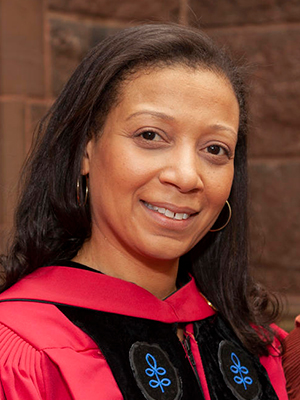Main navigation

On Wednesday, February 10, Russell Sage Foundation trustee Jennifer Richeson (Yale University) offered a webinar for RSF trustees, visiting scholars, and staff on her project, “The Mythology of Racial Progress,” which she is currently conducting with the support of a 2020 Andrew Carnegie fellowship. Richeson’s virtual presentation was one in a series RSF has held in lieu of its in-person visiting scholar seminars during the academic year. Richeson also published a related article in The Atlantic last September, “Americans Are Determined to Believe in Black Progress: Whether It’s Happening or Not.”
Richeson’s research focuses on the ways in which sociocultural group memberships such as race, gender, and socio-economic status affect the way people think, feel, and behave, especially during interactions with members of different groups. She also seeks to better understand how people reason about different forms of inequality and the implications of these processes for detecting and confronting inequality.
Richeson began her presentation by highlighting a one-man protest in Mississippi in the wake of the murder of George Floyd, led by Bob Smith, a 75-year-old former SNCC member who participated in the Bloody Sunday civil rights march in 1965. His ongoing struggle for racial justice underscores Richeson’s claims that there are widespread misperceptions of racial progress in America. She discussed the ways that Americans are invested in a false idea of linear, progressive ascendance towards ever-improving racial progress, with events like former President Barack Obama’s 2008 election signaling the beginning of a “post-racial” society.
Richeson began this research project on perceptions of racial economic equality in collaboration with social psychologist Michael Kraus (Yale University) in 2016. A diverse group of over 1,000 survey respondents answered questions designed to gauge their ideas about racial disparities around income and wealth. They were asked, for example, “For about $100 of annual income that an average White family has today, how much annual income does the average Black family have today?” They also were asked to estimate this figure in 1947. While respondents’ perceptions of past gaps between White and Black families’ incomes were closer to the actual figures, respondents consistently overestimated both income and wealth parity between Blacks and Whites in the present. Respondents expressed wildly inaccurate perceptions of how much wealth Black Americans have. They were overly optimistic about racial economic equality, with their guesses far off from the actual statistics: Black families had $5 of wealth for every $100 of White family’s wealth in 1963, and had roughly $10 of wealth for every $100 of White family’s wealth in 2016. These overestimates were particularly marked among white people and people with higher incomes.
Richeson described how her studies explored the cognitive motivation for the dissonance between the data on racial economic inequality and perceptions of the issue. Respondents were asked to read about the continuing legacy of racism, heard anecdotes about how Black families experienced this inequality, and, in some cases, were presented with data about Black/White wealth and income gaps. They were then asked, in follow up surveys several months after initial contact, to estimate these figures again. Despite these interventions, across studies, respondents still underestimated both past and current racial wealth disparities. Richeson underlined the significance of the profound persistence of misconceptions about racial equality, stating that, “The mythology of racial progress—or the belief that our nation is naturally and automatically progressing to some pre-ordained state of racial equality— absolves us of responsibility for doing the work necessary to create the racially just society we value.”
Among the reasons that Richeson outlined for these inaccurate perceptions of racial progress include racial and socioeconomic segregation. She also pointed to the persistence of narratives around the American Dream, which emphasize the roles of individual work ethic and merit in, and ignore structural racism and other barriers to, achieving economic and other markers of success. Survey participants who expressed strong belief in a just world were more likely, regardless of race, to overestimate racial economic parity. Richeson also pointed to future elements of this research project, including exploring how people’s perceptions of racial wealth disparities affect their support for policies designed to redress inequality, for example, “baby bonds” that offer public trust funds to children. Richeson reflected on the policy implications of her research studies, stating, “This research is important because people are unlikely to support policies to reduce the staggering racial wealth gap if we do not recognize or acknowledge that it exists.”
Jennifer Richeson is the Philip R. Allen Professor of Psychology at Yale University. The foundation has provided grant support for Richeson’s research projects, which examine multiple psychological phenomena related to cultural diversity. Her work generally concerns the ways in which sociocultural group memberships such as race, gender, and socio-economic status impact the way people think, feel, and behave, especially during interactions with members of different sociocultural groups. Professor Richeson has been recognized with many honors and awards, including a MacArthur Foundation Fellowship, the Distinguished Scientific Award for Early Career Contributions to Psychology from the American Psychological Association (APA), the John Simon Guggenheim Memorial Foundation fellowship, and the Career Trajectory Award from the Society of Experimental Social Psychology. Professor Richeson is an elected member of the National Academy of Sciences and the American Academy of the Arts and Sciences, and in 2019, received an honorary doctorate from Brown University. Richeson was born and raised in Baltimore, MD. She earned a Bachelor of Science in psychology from Brown University, and a MA and PhD in social psychology from Harvard University. Prior to joining the Yale faculty in 2016, Richeson was the MacArthur Professor of Psychology at Northwestern University. She joined RSF’s board of trustees in 2019.





